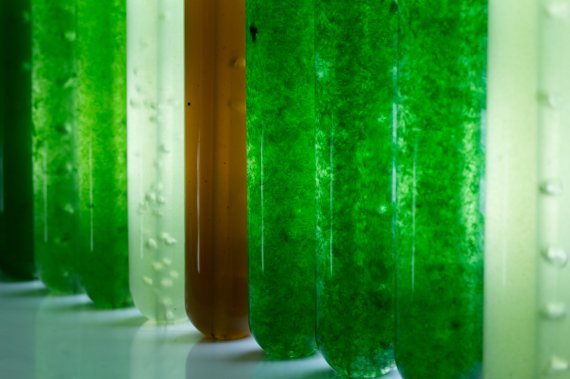© Shutterstock
Microalgae can be found all over the world, from the oceans to the canals of Amsterdam — and industrial bioreactors, where they are used for the production of biofuels and polymers for making plastics. These microalgae are often accompanied by specific bacteria. Reasearch into the effects of this combination on industrial processes is still being carried out. ‘So far, research has focused mainly on the positive effects of these bacteria, but they can also have negative effects’, says Gouveia, who obtained his doctorate in Bioprocess Engineering on 19 December. Gouveia discovered that bacteria inhibit the growth of certain microalgae.
Sustainable plastics
Gouveia studied the effect of various bacteria on the microalgae Botryococcus braunii, which is a promising candidate for use in industry for the production of exopolysaccharides (EPS). EPS are sugars that are used in food products or in the manufacture of sustainable plastics. Gouveia investigated which bacteria are found with the algae and what effect these bacteria have on the algae. He identified three families of bacteria that are found among all algae strains: Rhizobiaceae, Bradyrhizobiaceae and Comanonadaceae.
 B. braunii (green bolls) produces hydrocarbons (grey)
B. braunii (green bolls) produces hydrocarbons (grey)
which can be used for making biofuel. © Joao Gouveia
Next, Gouveia used various ways to inactivate the bacteria. He selected a specific strain of B. braunii that produces large quantities of EPS and added antibiotics to inhibit the bacteria. The outcome was surprising. The algae produced less EPS and their growth was slowed down or even halted entirely. Most antibiotics, with the exception of penicillin, slowed down the algae growth. Another remarkable observation was that the algae growth was not inhibited by penicillin, but the algae did produce less EPS. Gouveia: ‘We think that we may be killing certain bacteria with the antibiotics, so that other bacteria that have an adverse effect on EPS production gain the upper hand.’
Purely negative effects
In a following experiment, Gouveia used UV light. This treatment deactivated 99 percent of the bacteria, which increased EPS production by a factor of two. The algae also grew better. Based on these results, the researcher concluded that the bacteria found with B. braunii have purely negative effects on the algae. ‘Perhaps the bacteria have an added value in nature, but they can’t be used in industrial processes to improve the growth of B. braunii and similar microalgae. In fact, contamination of the bioreactors with bacteria needs to be prevented.’
Gouveia also presented his research during the FameLab Netherlands Final 2015. Watch the video:
You might also like:
Algea factory requires 5 more years of research

